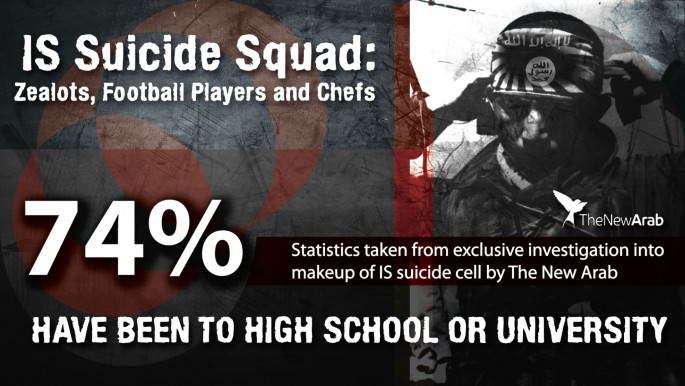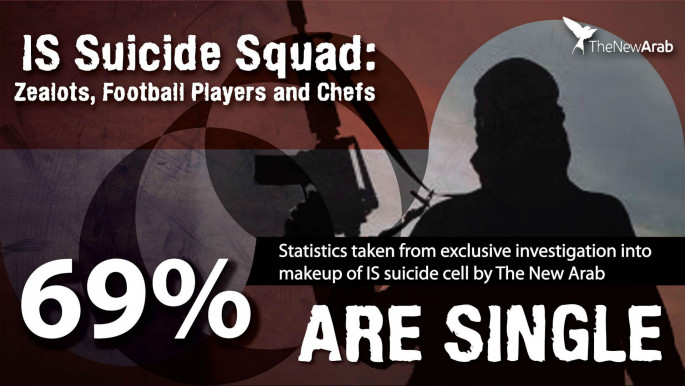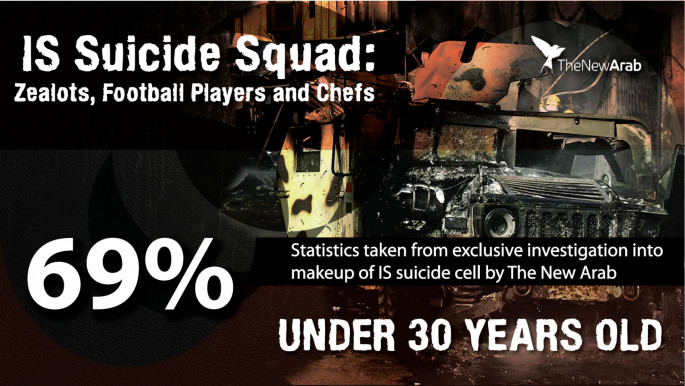Islamic State's 'suicide squad': Zealots, footballers and French chefs
After being released from prison following the 2011 uprising he left the country for Turkey, where while on the border with Syria he phoned his family to tell them he was joining the Islamic state group [IS]. Since then, communication between Abu al-Harith and his father has been few and far between.
The IS militant left behind a wife and child, who have no idea whether he is alive or has blown himself up in a suicide attack as it seems the young man has enlisted himself to IS' "martyrdom unit", along with 121 other potential suicide bombers between mid-2013 and 2014, according to IS documents known as "the mujahideen files".
Where do IS suicide bombers come from?
IS official documents for its suicide bomber recruits include 23 data entries, starting off with their names and nom de guerres, and ending with the dates, locations and notes on their deaths.
The New Arab has analysed 121 documents of an official IS file named "the martyrs", which was leaked by Syrian news site Zaman al-Wasl, revealing that suicide bombers from more than 20 countries have signed up for the so-called "martyrdom unit".
Saudi Arabians are at the top of the list of IS militants who have enlisted themselves to be trained to carry out suicide attacks with 32, choosing death by blowing themselves up as opposed to roles as rank and file soldiers or "inghimassi solders" – troops who submerse themselves into the enemy's line with no intent to come back alive.
 |
On the forms, most of the Saudi militants have filled in their nationality as "Gulfi" or used the term "the land of the Two Holy Mosques" instead of Saudi Arabia. |  |
On the forms, most of the Saudi militants have filled in their nationality as "Gulfi" or used the term "the land of the two Holy Mosques" instead of Saudi Arabia.
Tunisia is second on the list with 25 suicide bombers, followed by Morocco with 18, Egypt with 12, Libya and Syria with 7, Spain with 4, Lebanon with 3, Kuwait with 2 and finally Turkey, Italy, France, Germany, Uzbekistan, Afghanistan, Sudan, Algeria, Jordan, Palestine and Yemen with one each.
"These statistics are to be expected. IS' strategy can be summed up as having Iraqis as leaders, Tunisians as law enforcers and Saudis as foot soldiers and suicide bombers," said expert in militant Islamic groups, Hudhaifa Abdallah Azzam.
"The small number of Iraqis and Syrians opting to become suicide bombers is because many of them have been forced or coerced into joining the group," he added.
 |
|
| Read also: Where to IS and al-Qaeda get their explosives? |
Consultant for the Iraqi Centre for Strategic Studies, Yahya al-Kubaisi, explained the lack of Iraqis on the list of recruits was because of the nature of religious observation in Iraq.
"Very few Iraqis have historically become suicide bombers because religion in Iraq is based on rituals, not self-sacrifice such as what has happened in Egypt and Saudi Arabia," Kubaisi said.
Few Palestinian bombers
Political analyst Marwan Shihadeh said there are so few Palestinians on the list because they are more submerged in their domestic problems and are less interested in killing other Muslims.
 |
Young Palestinians are very aware and their enemy is obvious: the Zionist occupiers |  |
"Young Palestinians are very aware and their enemy is obvious: the Zionist occupiers," Shihadeh told The New Arab.
Researcher in Palestinian affairs, Rami Salameh, said another factor was the long presence of active political factions and groups in Palestine in comparison to other Arab countries, where political life is dominated by authoritarian single parties.
Characteristics in common
After analysing the leaked data, particularly the ages, education, educational background and social status of the 121 members of IS' "martyrdom unit", it becomes clear that many of the militants come from similar backgrounds.
Sixty-nine percent are under the age of thirty. Another 69 percent are unmarried. While 72 percent have limited religious education and 74 percent have secondary school or university degrees.
"This is not surprising. If you just look at the perpetrators of the September 11 attacks all of their details are consistent with these figures. They all went to non-religious schools with the exception of the Saudi Abdel Aziz al-Omari, who studied Sharia law," said professor of political ethics, Mohammad al-Shinqiti.
Shinqiti added that it was interesting that most of the Saudis were under the age of 30, while Tunisia took the top spot for suicide bombers under the age of 40.
 |
Most suicide bombers do not have a background in Sharia studies |  |
Marwan Shihadeh agreed with the data.
"Of course the age group between 16 and 26 would be most attracted to this. This is a period of significant psychological development," Shihadeh told The New Arab.
"These immature and rebellious young men are in the process of forming their personalities, making it easier to convince them to sacrifice their lives for an ideology such as the dream of the caliphate," he added.
The data revealed that 50 of the men had completed secondary school, 40 had university degrees or were enrolled in university, only 28 had finished primary school, while 3 did not record their level of education.
 |
|
Of 32 Saudi suicide bombers, 31 had either completed their secondary school education or a university degree.
They were followed closely by Tunisian suicide bombers, where 19 [of 25] had either completed their secondary studies or been to university.
Meanwhile, only 13 of 18 Moroccan suicide bombers were schooled to an elementary level.
"Khalid Sheikh Mohammad, who admitted to being the mastermind behind September 2001 attacks, went to Chowan College, a Christian Baptist school in North Carolina," Shinqiti said, "He moved from there to an agricultural and technical university within the same state."
This implies that linking the lack of access to education and a modest social background with acts of terrorism is flawed and biased, the expert added.
 |
Eighty-seven of 121 suicide bombers recorded their level of religious awareness as “basic.” |  |
Religious attainment and marital status
The level of religious attainament reveals a lot about the nature of the religious mindset of the bombers.
Eighty-seven of 121 suicide bombers recorded their level of religious awareness as "basic".
Nineteen bombers noted that their level was "medium" as 10 recorded their level as advanced, while only five were quite "learned".
The absence of religious scholars among IS suicide bombers indicates that those immersed in religious studies are less likely to commit suicide as they look into the permissibility of the act, researcher in Islamic movements, Hassan Abu Haniyeh said.
But what remains an important factor in the social background of the bombers is their marital status.
Only four of the Saudi suicide bombers were married, while 24 were recorded as single. Four did not disclose their marital status.
Meanwhile, only one Tunisian was married while 24 were reported to be single. Four did not disclose their marital status.
 |
Most suicide bombers were young and single |  |
Most suicide bombers were single because their age fell between 16 and 26, according to Abu Haniyeh. This is often still young for marriage.
IS has deliberately recruited unmarried men, as they are most likely to embark on suicide attacks without hesitation, Abu Haniyeh added.
 |
|
Employment history
The study also documented the occupations of the members of "the martyrdom unit".
Thirteen of the Saudi suicide bombers worked in governmental bodies or in companies. One worked in hotel management, while another worked in ground handling services at the airport and two were military officers.
But in Tunisia, they held more distinct positions.
One was documented as a football player and fitness coach, while another was a journalist and a few were computer graphic designers.
The majority of the Tunisian suicide bombers, however, worked in businesses.
Of all "the martyrdom unit" only one Tunisian was recorded to have formerly been an imam in a mosque.
 |
Suicide bombers' employment history included professions such as footballers, chefs, graphic designers, computer engineers but almost none were imams or preachers |  |
Meanwhile, most of the Moroccan suicide bombers were manual labourers, working mostly in construction or as car mechanics.
This too was the case with the Syrian suicide bombers.
Egyptian suicide bombers, on the other hand, held a number of different professions varying between the fields of law, medical engineering and agriculture.
Positions in the military were popular among Libyan suicide bombers, as one was recorded to have been a policeman while another worked as a sound engineer for Tawheed Radio, affiliated to the Ansar al-Sharia in Sirte.
Meanwhile, all three Lebanese suicide bombers were computer engineers.
The remaining members of the "the martyrdom unit" had held positions in cooking, including a French suicide bomber who had been a chef.
Others, such as Abu Assad al-Zarqawi, were graphic designers.
 |
Palestinian Abu Anas al-Shami sold chocolates, while Abu Qatada al-Turki worked as a central heating and gas engineer. |  |
Palestinian Abu Anas al-Shami sold chocolates, while Abu Qatada al-Turki worked as a central heating and gas engineer.
Shinqiti criticised those who conclude that unemployment and poverty are a factor leading to becoming a suicide bomber.
"Those who carried out the September 11th attacks and other [terrorist] activities across the world do not come from a poor background. They come from a varied social and class backgrounds, most of which are middle-class and some are even from the upper class,"
Political analyst Marwan Shihadeh finds that financial rewards have no value for those who commit suicide attacks as they seek to end their lives.
"Some of those who commit suicide have jobs that bring in a high level of income," Shihadeh said, "But the reward they are seeking is 'in heaven' and the Houris [virgin women]."
Abu Haniyeh also stressed that most of the suicide bombers in Europe come from middle class backgrounds not from the lower or poorer classes.
He pointed out that the conclusions of the study "The new martyrs of God" [Los nuevos mártires de Alá] by the Iranian anthropologist Farhad Josrojavar agrees with the findings made by The New Arab.
 |
|
 |
Would-be suicide bombers complained of not being able to drive manual and some asked for holidays |  |
'Workplace' challenges
In his membership form, the Lebanese suicide bomber, Abu Obeida al-Libnani, complains of weak vision and failure to see adequately at night as well as his inability to drive manual cars.
On the other hand, Syrian militant Abdallah bin Abdel Rahman wrote an intriguing comment calling on the leadership to not delay his suicide mission because he was suffering from pain caused by shrapnel in his head.
Meanwhile, Abu al-Kheir al-Muhajer, another Syrian bomber provided the militant group with his brother's number whom they were to contact via Whatsapp.
Saudi bomber, Khitab al-Jazrawi admitted he had never been formally trained, however pointed towards his involvement in "raids" to suggest experience in fighting. Then again, another Saudi requested his nom de guerre be changed from Abu Jouri al-Ghamdi to Abu Jihad.
When asked have you ever taken part in Jihad, Italian militant Abu Rawaha responded: "Yes, the jihad of the inner soul," referring to another meaning of the word which focuses on an internal struggle.
On the other hand, French fighter, Khitab al-Faransi, requested no one contact his family even after his death because he believed they would know of the news once he stopped contacting them.
Tunisian, Abu Mousa al-Tunisi, declared the passport he had presented was a fake, as was his name, according to a note written on the form.
Libyan suicide bomber, Muawiyah al-Leebi asked for the militant group to inform his family members of his death without mentioning the details of the suicide mission.
While militants usually leave one or two contact numbers, Egyptian Abu Basam provided an odd five numbers in the event of his death.
 |
The families of the suicide bombers were often left in the dark about the fate of their loved ones |  |
Suffering of family members
After attempting to contact the contact numbers provided, the investigation confirmed most of the phones were switched off or unresponsive, however, of the few accepted calls, one question led the conversation: "Is our son dead or alive?"
Among these was the father of an Egyptian suicide bomber who told The New Arab he did not want any details published to link him to his militant son due to security fears.
The father did not hide his sadness over the fate of his son. "I just want to know what has happened to him," he said, a sentiment shared by the brother of a Libyan militant who had lost his brother two years ago when he left to join IS.
"Even in his one phone call to us, he said we deserve to die if we do not support IS," his brother told The New Arab.
 |
IS suicide bombers were tricked about who their targets were and the locations of their deployments |  |
Deceiving the suicide bombers
Verified video footage filmed by an Egyptian militant shows IS had offered Mahmoud Abdel Rahman a suicide mission targeting Syrian army soldiers in the town of Harem.
However, upon arrival to the town, the 70-year-old realised the area was controlled by Syrian opposition groups and not regime troops as suggested by the militant group.
 |
|
The same trick was repeated with Saudi militant, Abu Talha who said IS trained him to attack the "apostates involved in the rape of our sisters: the al-Nusra Front".
The two accounts can be linked to Abu Musab al-Tunisi who posted a video on YouTube, accusing the group of taking advantage of those willing to carry out attacks by using religious rhetoric in order to convince them their targeted attacks would not harm women or children, but "apostates" opposing IS.
Those who refuse to take part in such missions are branded traitors or are sent to heated frontlines like Anbar or Salah al-Din provinces, jihadi movements expert, Hudhaifa Abdallah Azzam revealed.
 |
Those who refuse to take part in such missions are branded traitors or are sent to heated frontlines |  |
"In the beginning, it would depend on whether the militants volunteered to take part in these missions but it has now been made compulsory to do so," he said, adding that "militants are now bound by a major pledge of allegiance to the group spares no room for betrayal."
Azzam confirmed that suicide bombers from the militant group were previously trained by senior commanders in IS military bases in Raqqa and Tal Abyad, near regime-held areas.
Militants are included in special battalions where they are trained and prepared for a variety of suicide missions in case the militant backtracks in the last moments of the mission, researcher Abu Haniyeh said.
The training is divided into three stages; education, training and preparing for the mission, he added.
 |
These youths are angry and they feel wronged. They have a superficial religious knowledge…which makes it easy to convince them to blow themselves up for their ideas |  |
Why do they do it?
IS' suicide bombers blow themselves up because they feel oppressed in their countries or because they have other grievances such as foreign invasions, says Mohammad al-Shinqiti.
"These youths are angry and they feel wronged. They have superficial religious knowledge, which makes it easy to convince them to blow themselves up for their convictions," he added.
Suicide attacks are an old phenomenon that predate the current Islamic context, said Mutaz al-Khatib from the Faculty of Islamic Studies in Doha, citing the example of Kamikaze pilots during the Second World War and the Tamil Tigers in India.
It was the Lebanese and Palestinian resistance groups that first used suicide attacks in the Islamic context, he said.
"There was a debate at the time about their legality [under Sharia]. Sheikh [Youssuf] al-Qaradawi issued a fatwa permitting them, not absolutely but as a means if no other means is available," said Khatib.
"Some Salafi scholars outlawed them, led by the mufti of Saudi Arabia, but the origin of the idea has to do with the old idea of [immersing oneself in the enemy ranks], where Muslim fighters in war can attack enemies even when facing certain death," he added.
This is different from suicide bombings, insisted Khatib, and there are a myriad conditions that apply before resorting to such tactics, which must be only used against "aggressors" by the legitimate authorities and rogue factions, he said.
Khatib said most suicide recruits lack a profound understanding of Sharia or are recent converts, and thus are easier to manipulate and control. The scholar stressed that IS' ideas ultimately contradict the Islamic tradition governing the rules of warfare.





 Follow the Middle East's top stories in English at The New Arab on Google News
Follow the Middle East's top stories in English at The New Arab on Google News


